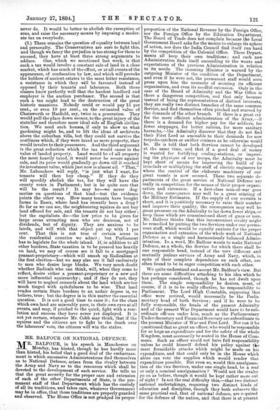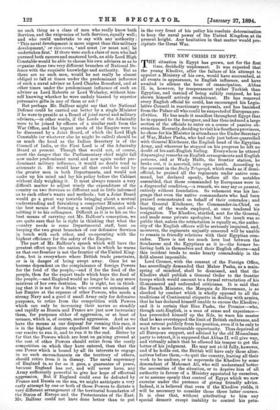MR. BALFOTJR ON NATIONAL DEFENCE.
MR. BALFOUR, in his speech in Manchester on Monday, has hinted, though he has hardly more than hinted, his belief that a good deal of the embarrass- ment in which successive Administrations find themselves as to National Defence, arises from the rivalry between the Army and Navy as to the resources which shall be devoted to the development of each service. He tells us that the great security for the proper care and extension of each of the other Departments of State, is the per- manent staff of that Department which has the custody of all its traditions, and takes care, whatever Government may be in office, that those traditions are properly guarded and observed. The Home Office ii not grudged its proper proportion of the National Revenue by the Foreign Office, nor the Foreign Office by the Education Department. The Board of Trade does not complain because the Local Government Board asks for the means to enlarge its sphere of action, nor does the India Council find itself run hard by the competition of the Colonial Office. These Depart.. ments all keep their own traditions ; and each new Administration finds itself succeeding to the wants and expectations of the previous Administration in relation to its needs. The incoming Minister is warned by the outgoing Minister of the condition of the Department, and even if he were not, the permanent staff would soon press upon him the necessity of securing its efficient organisation, and even its needful extension. Ouly in the case of the Board of Admiralty and the War Office is there a dangerous competition, and that only because instead of being the representatives of distinct interests, they are really two distinct branches of the same common Service, and find themselves often pinched and starved by the demands of the other branch. If there is a great cry for the more efficient administration of the Army,—if there is a demand for higher pay for the soldiers, for fewer stoppages, for better rations, for more sanitary barracks,—the Admiralty discover that they do not find their First Lord as amenable to their demands for new torpedo-catchers or swifter cruisers as he otherwise would be. He is told that both Services cannot be developed at the same time, and that if a good deal of money is wanted for fortifying coaling-stations, or improv- ing the physique of our troops, the Admiralty must be kept short of means for improving the build of its ironclads or multiplying the staff of electric engineers by whom the control of the elaborate machinery of our great vessels is now secured. These two separate de- partments of the great service of National Defence are really in competition for the means of their proper organi- sation and extension. If a first-class man-of-war goes down, the consequence may well be a great stinting of the Military Estimates. If the supply of our recruits is short, and it is positively necessary to raise their number and improve their quality, the consequence may well be great pressure on the Admiralty to lay down fewer ships, or keep those which are commissioned short of guns or men. Mr. Balfour thinks that this inconvenient rivalry might be remedied by putting the two Services under one perma- nent staff, which would be equally anxious for the proper organisation and extension of the whole work of National Defence as a single and harmoniously balanced Admin- istration. In a word, Mr. Balfour wants to make National Defence, as a whole, the Service for which there shall be one responsible head, instead of the very different and mutually jealous services of Army and Navy, which, in spite of their complete dependence on each other, are often found to be in eager competition with each other.
We quite understand and accept Mr. Balfour's view. But there are some difficulties attaching to his idea which he has perhaps considered, though he has not dwelt upon them. The single responsibility he desires, must, of course, if it is to be really effective, be responsibility to Parliament. The Lord High Constable, supposing that office were revived, would necessarily be the Parlia- mentary head of both Services ; and if he were to be fully responsible, the heads of the present Admiralty and of the present War Department would have to be sub- ordinate of under him, much as the Parliamentary Under-Secretary and Financial Secretary are subordinate to the present Minister of War and First Lord. Nor can it be questioned that so great an officer, who would be responsible for so huge an expenditure and for the safety of the whole Kingdom, must necessarily be seated in the House of Com- mons. Such an officer would not have full responsibility unless he could himself defend his policy against the most formidable attacks which might be made on his expenditure, and that could only be in the House which alone can vote the supplies which would render that expenditure possible. But even so, would this amalgama- tion of the two Services, under one single head, be a real or only a nominal amalgamation ? Would not the rivalry go on as before, though it would be kept rather more out of sight ? Is not the real difficulty this,—that two distinct national undertakings, requiring two distinct kinds of education and discipline, though they both subserve the same practical end, that of national defence, are required for the defence of the nation, and that there is at present no such thing as a class of men who really know both Services, and the exigencies of both Services, equally well; and who could undertake to say with any authority : This naval development is more urgent than this military development,' or vice-versa, and must [or must not] be undertaken first.' If there were such a class of men who had pursued both careers and mastered both, an able Lord High Constable would be able to choose his own advisers so as to organise these two very different branches of National De- fence with the requisite knowledge and authority. But as there are no such men, would he not really be almost obliged to fall at times under the predominant influence of such a naval adviser as Lord Charles Beresford, and at other times under the predominant influence of such an adviser as Lord Roberts or Lord Wolseley, without him- self knowing whether he were unduly biassed by superior persuasive gifts in any of them or not ? But perhaps Mr. Balfour might say that the National Defence could be carried out better by a single Minister if he were to preside at a Board of joint naval and military advisers,—in other words, if the Lords of the Admiralty were to be joined by officers of a similar rank from the War Office, and the urgent needs of the Empire were to be discussed by a Joint Board, of which the Lord High Constable (or whatever else he might be called) should be as much the head as the Indian Secretary is of the Council of India, or the First Lord is of the Admiralty Board at present. Though that would not, of course, avert the danger that the Parliamentary chief might fall now under predominant naval and now again under pre- dominant military influence, it would no doubt tend to attenuate it. He would hear all that could be said by the greater men in both Departments, and would not make up his mind and lay his policy before the Cabinet without duly weighing it. It must always remain a very difficult matter to adjust wisely the expenditure of the country on two Services so different and so little informed as to each other's wants and methods ; but a Joint Board would go a great way towards bringing about a mutual understanding and furnishing a competent Minister with the best means of forming a sound judgment, and slit- mating it to his colleagues. Difficult as it is to hit on the best means of carrying out Mr. Balfour's conception, we are quite sure that he is right in thinking that what the country needs is some Departmental staff, bent on keeping the two great branches of our defensive Services in touch with each other, and co-operating with the highest efficiency for the safety of the Empire. The part of Mr. Balfour's speech which will have the greatest effect upon the nation is that in which he warns us that our frontier is not the frontier of the United King- dom, but is everywhere where British trade penetrates, or is in danger of being swept away. Once let us become dependent on the complaisance of foreign Powers for the food of the people,—and if for the food of the people, then for the export trade which buys the food of the people,—and England would no longer be in any sense mistress of her own destinies. He is right, too in think- ing that it is not for a State who covets no extension of her Empire at the expense of other Powers, who needs a -strong Navy and a good if small Army only for defensive purposes, to retire from the competition with Powers which can only be increasing their navies so steadily and rapidly as Russia and France are just now increasine them, for purposes either of aggression, or at least of menace, which is, of course, moral aggression. And as we have the means at our disposal for running this race, it is in the highest degree expedient that we should show our resolve to run it, and to run it to the end. Better by far that the Powers which are bent on gaining ground at the coat of other Powers should retire from the costly competition on which they have entered, than that the one Power which is bound by all its interests to engage in no such encroachments on the territory of others, should retire from it in dismay. The naval supremacy of England is, so far as it goes, a guarantee of peace, because England has not, and will never have, any Army sufficiently powerful to give her hope of effectual aggression. But if England could ever be defeated by France and Russia on the sea, we might anticipate a very early attempt by one or both of those Powers to dictate a very different arrangement of the territorial boundaries of the States of Europe and the Protectorates of the East. Mr. Balfour could not have done better than to put in the very front of his policy his resolute determination to keep the naval power of the -United Kingdom at its present height. Any hesitation in that matter would pre- cipitate the Great War.



















































 Previous page
Previous page